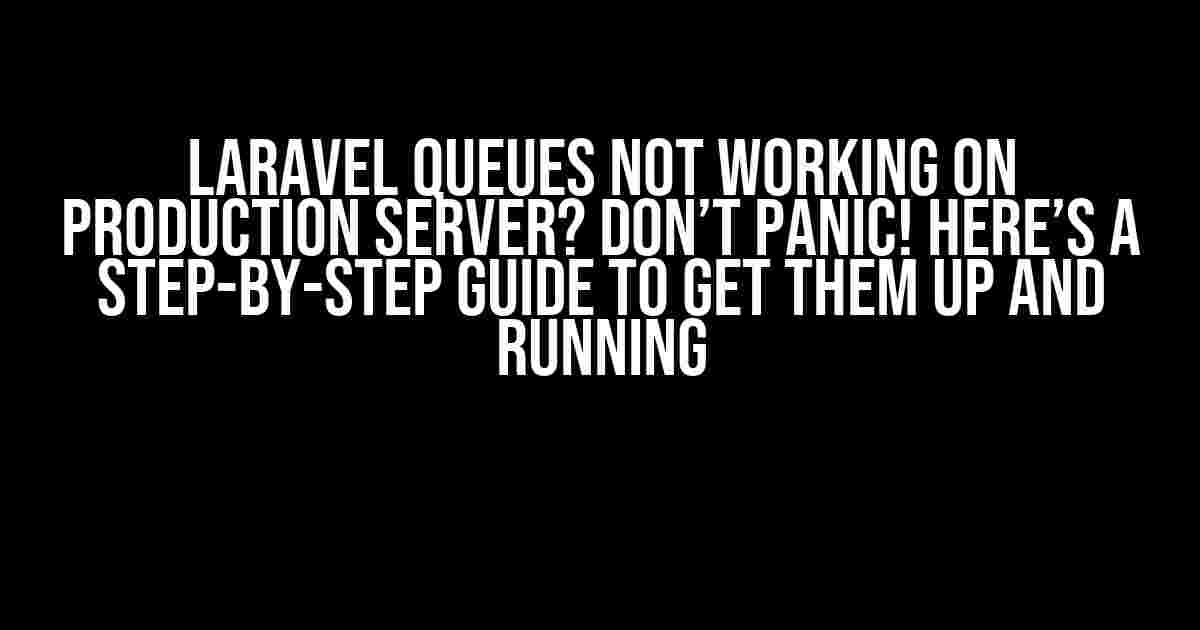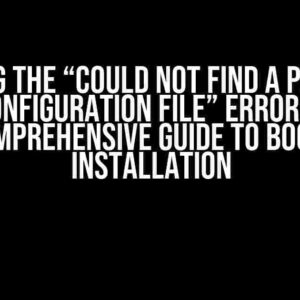Are you stuck with Laravel queues that refuse to work on your production server? You’re not alone! Many developers have faced this frustrating issue, and in this article, we’ll walk you through the troubleshooting process to get your queues up and running smoothly.
- Understanding Laravel Queues
- Troubleshooting Laravel Queue Issues on Production Server
- Step 1: Check the Queue Configuration
- Step 2: Verify Queue Worker Configuration
- Step 3: Check the Message Broker
- Step 4: Verify Job Dispatching
- Step 5: Check the Job Handler
- Step 6: Verify Dependencies and Requirements
- Step 7: Check Server and Environment Configuration
- Step 8: Debug and Troubleshoot
- Common Solutions to Laravel Queue Issues
- Conclusion
Understanding Laravel Queues
Laravel queues provide an efficient way to handle time-consuming tasks in the background, allowing your application to respond quickly to user requests. Queues use a message broker to store and process jobs, which are then executed by a worker. However, when queues don’t work as expected, it can lead to performance issues and frustrated users.
Symptoms of Laravel Queue Issues
Before we dive into the troubleshooting process, let’s identify the common symptoms of Laravel queue issues on a production server:
- Jobs not being processed or executed
- Queue workers not running or not responding
- Jobs stuck in the “pending” state
- Error messages or exceptions in the queue logs
Troubleshooting Laravel Queue Issues on Production Server
To resolve Laravel queue issues on your production server, follow these step-by-step instructions:
Step 1: Check the Queue Configuration
Verify that your queue configuration is correct and matches your production environment. Check the following:
// config/queue.php
'default' => env('QUEUE_DRIVER', 'sync'),
'connections' => [
'sync' => [
'driver' => 'sync',
],
'database' => [
'driver' => 'database',
'table' => 'jobs',
'queue' => 'default',
'retry_after' => 90,
],
],
Make sure the `QUEUE_DRIVER` environment variable is set to the correct driver (e.g., `database` or `redis`) and that the connection settings are correct.
Step 2: Verify Queue Worker Configuration
Check that your queue worker configuration is correct and running. Run the following command to check the worker status:
php artisan queue:work --tries=3
If the worker is not running, start it by running the following command:
php artisan queue:work --daemon
Step 3: Check the Message Broker
Verify that your message broker (e.g., Redis or RabbitMQ) is installed, configured, and running correctly. Check the broker’s logs for any errors or issues.
Step 4: Verify Job Dispatching
Check that jobs are being dispatched correctly by verifying that the `dispatch` method is being called correctly. You can do this by:
use Illuminate\Support\Facades\Bus;
// ...
Bus::dispatch(new MyJob($data));
Make sure the `MyJob` class is correctly defined and implements the `Illuminate\Contracts\Queue\ShouldQueue` interface.
Step 5: Check the Job Handler
Verify that the job handler is correctly defined and implemented. Check that the handler is registered in the `app/Providers/EventServiceProvider.php` file:
use App\Jobs\MyJob;
// ...
protected $listen = [
'App\Events\MyEvent' => [
MyJob::class,
],
];
Step 6: Verify Dependencies and Requirements
Check that all dependencies and requirements are met, including:
- Ensure the `league/commonmark` package is installed (required for Laravel 7.x)
- Verify that the `redis` package is installed and configured correctly (if using Redis as the message broker)
Step 7: Check Server and Environment Configuration
Verify that your server and environment configuration meet the requirements for running Laravel queues. Check:
- Server timezone and clock synchronization
- CRON job scheduling (if using CRON to run queue workers)
- Environment variables (e.g., `QUEUE_DRIVER`, `REDIS_HOST`, etc.)
Step 8: Debug and Troubleshoot
Use Laravel’s built-in logging and debugging tools to troubleshoot queue issues. Check the:
- Queue logs (e.g., `storage/logs/queue.log`)
- Job logs (e.g., `storage/logs/jobs.log`)
- Error messages and exceptions
Use tools like `dd()` or `Log::debug()` to debug your code and identify issues.
Common Solutions to Laravel Queue Issues
Here are some common solutions to Laravel queue issues:
| Issue | Solution |
|---|---|
| Queue worker not running | Run `php artisan queue:work –daemon` to start the worker |
| Jobs stuck in “pending” state | Verify that the queue worker is running and that the job handler is correctly implemented |
| Error messages or exceptions in queue logs | Debug and troubleshoot the issue using Laravel’s logging and debugging tools |
| Queue configuration issues | Verify that the queue configuration matches the production environment and that the connection settings are correct |
Conclusion
Laravel queues can be a powerful tool for handling background tasks, but when they don’t work as expected, it can be frustrating. By following these step-by-step instructions and troubleshooting techniques, you should be able to resolve common Laravel queue issues on your production server. Remember to stay calm, think logically, and don’t hesitate to seek help if needed.
Happy coding!
Frequently Asked Question
Are you frustrated because your Laravel queues aren’t working on your production server? Don’t worry, we’ve got you covered! Here are some frequently asked questions and answers to help you troubleshoot the issue.
Why aren’t my Laravel queues running on my production server?
This is likely because your production server doesn’t have a queue worker running. Make sure you’ve installed the required packages, including `league/flysystem-aws-s3-v3` and `predis/predis`, and configured your queue driver correctly. Also, don’t forget to run the command `php artisan queue:work` to start the queue worker.
I’ve configured my queue driver correctly, but my jobs still aren’t running. What’s wrong?
Check if your queue connection is set to the correct driver in your `config/queue.php` file. Also, ensure that your queue worker is running in the correct environment. You can do this by specifying the environment when running the `queue:work` command, like this: `php artisan queue:work –env=production`.
I’m using Redis as my queue driver, but my jobs are still not running. What’s going on?
If you’re using Redis as your queue driver, make sure that you’ve installed the `predis/predis` package and configured Redis correctly. Also, check if Redis is running on your production server and that the credentials are correct. You can test your Redis connection by running the command `php artisan redis:ping`.
I’ve checked everything, but my jobs are still not running. How can I debug the issue?
To debug the issue, try checking your queue logs to see if there are any errors or exceptions. You can do this by running the command `php artisan queue:listen` to watch the queue logs in real-time. Additionally, you can check your system logs to see if there are any errors or issues that might be preventing your queue worker from running.
How can I ensure that my queue worker runs continuously on my production server?
To ensure that your queue worker runs continuously, you can use a process manager like Supervisor to manage the queue worker process. This will automatically restart the queue worker if it crashes or exits. You can also use a cron job to periodically check if the queue worker is running and restart it if necessary.


